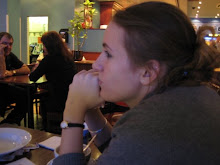 Shadows of Ecstasy by Charles Walter Stansby Williams
Shadows of Ecstasy by Charles Walter Stansby WilliamsMy rating: 3 of 5 stars
I love Charles Williams' books. Everyone who knows me knows this. Others may think them strange or obscure, but I find them pulsing with life and power. They remind me, in language that transcends knowing, what it is that I'd forgotten I'm looking for.
Honestly, though, I didn't know what to do with this book. Normally I like Williams' ambiguity -- I think it's part of his stories' power. I wouldn't say that I DIDN'T like it this time, only that it left me perplexed and confused, shaken and unsure.
Is Considine an antichrist or a returned messiah? Does it even matter? To some degree, it seems irrelevant to the story's point. A story that is about living in an ambiguous world, where no morality is certain, out of the necessity of your own being. Living the life you have to, in the face of the choices you can't control.
The problem with this is two-fold: 1. Is evil and goodness truly such a matter of relativity? Is physical action, such as murder, truly irrelevant if the perpetrator burns with what, for lack of other words, seems terrifying similar to the Joy of the Lord and the Glory of God? And while it's easy to thrust this back into our black and white understanding, and declare "NEVER!" what do we do with those Old Testament passages in which the prophets, and the God that they serve, seem to burn with just such joy, and act with just such a terrifying mix of innocence and violence? 2. Most of Williams books, the scholars agree, are ultimately about coinherence -- the beautiful mystery of unity. What does one do with a book, thrust in the middle of this collection, that seems to be about the necessity of living first and foremost for oneself? Of turning everything that is experienced inward, for personal power and gain? And the one antithesis to this -- Isabel who lives only for the other -- encourages her husband down its path, because it is what his soul craves. Yet if he were to succeed in his quest, it would separate him from that which makes him whole.
Who is the hero, who the villain? Who's path is righteous, who's selfish? Who makes the right choices, who the wrong? And what ending are we supposed to hope for? Williams doesn't tell us, and sometimes I wonder, does God?
View all my reviews >>

No comments:
Post a Comment